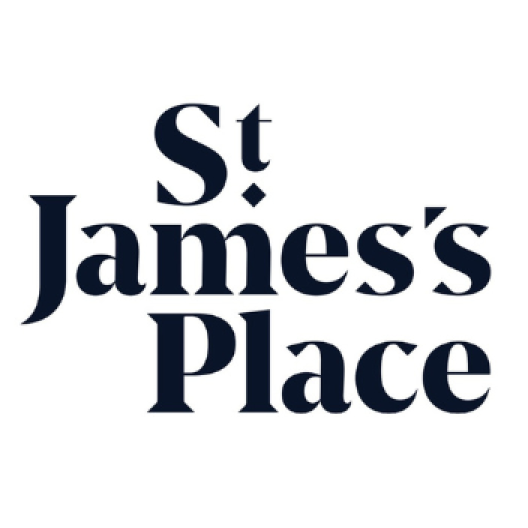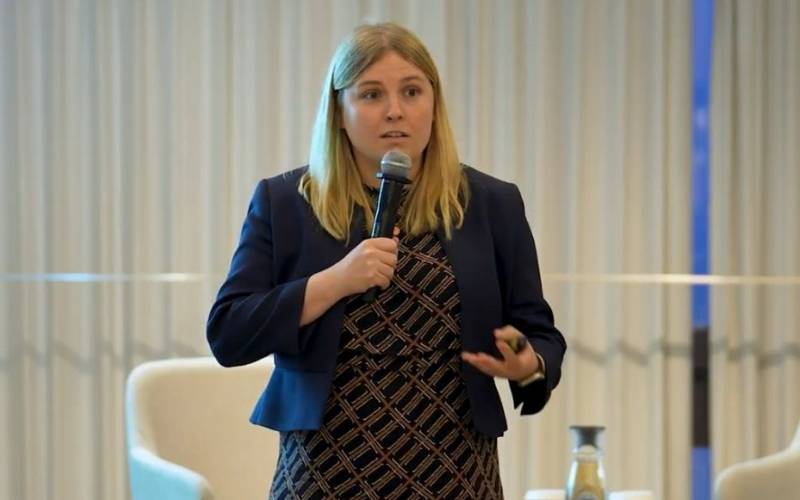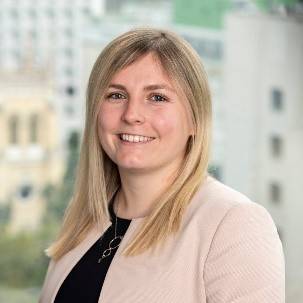
Discussing the Intricacies of Authentic Lesbian Visibility
Interviews
“If you are going to be an ally, it's all about lending a supportive ear, and sometimes that’s all you need to do,” - Ahead of Lesbian Visibility Week, Zoe Pearson, Head of Marketing for Asia at St. James’s Place, spoke to myGwork about the intricacies of lesbian representation, sharing her advice for allies who want to improve conditions for LGBTQ+ people in the workplace. She also discusses the specific struggles faced by the lesbian community that are too often overlooked.

Please tell us about yourself, your career to date, and your role at your organization.
My name is Zoe Pearson, my pronouns are she/her, and I'm the Head of Marketing for Asia in St. James’s Place. Primarily, we've got two regional hubs in Hong Kong and Singapore, and my role is looking after everything marketing related. From somebody's business card, through to sponsorships, through to online advertising, through to consultancy for our financial advisors. The full spectrum!
We’re lucky enough to have a lovely team in both locations. St. James’s Place have been really good to me, and I’ve been able to grow my career here over the last four years and move into my current role - which has been great!
Do you feel like there is enough visibility for lesbians today? If not, how do you think this could be improved?
I think it’s quite different in Asia, in general. There are nuances that make visibility even more important here. Quite often, people here will be out at work before they're out in other aspects of their life, so work acts as a safe place for a lot of people.
Do I think lesbians are visible enough? It's weird, isn't it? Because you live in your own little bubble, so in my world lesbians are quite visible! But that’s because of the spaces and places where I hang out with friends. Professionally, I can think of a few other heads of marketing in Hong Kong, who are out lesbians. But if I'm being honest, for some reason it seems there are fewer prominent lesbians than there are other people on the LGBTQ+ spectrum.
Did you see yourself represented in movies/books/the media growing up? How do you think this affected you?
I didn't come out until later in life. I would have been in my late 20s at the time, and I changed from viewing myself as somebody who was bisexual or on that spectrum through to someone who would define themselves as a lesbian. But I think the lack of representation in the media did impact me. There’s a bit of a gap in content around lesbian visibility. Every gay woman I know have all found all the same television shows, all the same books, all the same films, and have watched them all to death. For whatever reason, there's definitely less content.
People can also often have a really narrow view of what a lesbian might look like or behave. Coming out later in life is quite common as well, amongst lesbians. I was in a heterosexual relationship, I used to be married to a man, and I’ve found this is such a common story. I think it has to do with a lack of role models and less representation that it takes people a little bit longer to understand themselves.

What are some challenges that the lesbian community face that most people don’t realize?
I remember before introducing my partner Phoebe to colleagues, I would consciously drop hints and try to prepare them in advance, which is just so ridiculous. There shouldn't really be any need to do that. But you build it up in your own head, and that’s a struggle many of us face, I think. There are some opportunities that come with it as well, though. For me, because there were no prominent role models, I became really keen to be one myself.
We have St. James's Place LGBTQ+ pride parties all through June, where I go out and I speak at workplaces and on panels, and I'm really open with all of my team in office. And if you do want to grow and raise your profile, this is a great opportunity for career growth, and you get to do a few things that you maybe wouldn't ordinarily get to do.
What are some tips you would give someone who wants to be a better ally to the lesbian community?
For me, the little things are what make people good allies. There's lots of people who are "good allies" in private, but if you're going to be an ally, then you've got to be vocal. If you want to be a good ally, stand by what you're saying. Call things out. I’ve had someone outside of work say to me “Well, I don't have a problem with it,” and that's not really good enough. You have to show support.
Throughout your career, have you seen your identity represented in senior staff?
There are quite a few. I think another thing that's very common in the LGBTQ+ community is that we always feel like we want to give back, so at St James’s Place we'll hopefully be participating in a few sports within the Gay Games later in the year in Hong Kong, and I'm also volunteering for community business, which is a mentor programme for the LGBTQ+ community here. The good thing about those kinds of programmes is getting to put all that talent into one place. But within our own organisation alone, we've got a few key role models in senior roles.
Have you ever struggled to come out at work?
Yeah, I did struggle a little bit. But I don't think there was any real reason for that. I was at lunch with several of my colleagues, celebrating the start of the year, and a colleague came up to me and he gave me this massive hug and said “Oh, I'm so proud!” and all sorts of lovely things. I'm not sure how they heard about me coming out, but it was such an instant relief that someone in the room knew and was comfortable with it. And then at lunch, I just started saying it to people and it just carried on from there. And considering office culture, of course, most people found out pretty quickly, but it was a really supportive time. I have never had any negative experiences with my identity at St. James’s Place.
What do you think organizations can do to ensure everyone feels comfortable being themselves in the workplace?
I used to really underestimate the value of this. Some of the things that I've been a bit skeptical in the past are actually really important. Companies that change to the rainbow logo or put things at the bottom of their email signature, I used to just think it was all a bit ‘rainbow washing’. But having spoken to a few people now, I hadn't realized how much others actually really value that.
Saying that, I also think there's no point doing any of that if you don't put effort into the inclusion part. You need to balance the equitable, ongoing external view that you're positioning to the world and make sure it's actually reflective of the culture that you have. Particularly in Asia, I think things like LGBTQ+ communities within organizations are really, really important. And like I said, a lot of people are out at work before anyone or anywhere else, those kinds of communities are really valuable.
Is there anything else you wanted to add?
I was thinking back to being a good ally, but also how important it is just being somebody who listens, and somebody who is there to offer support. If you are going to be an ally, it's all about lending a supportive ear, and sometimes that’s all you need to do. You don't necessarily need to take action all the time.
Keep up to date with the latest myGnews

